Smart Scheduling: How it Works and How to Get Started
November 28, 2024
November 28, 2024
December 26, 2025
December 26, 2025
Missing meeting details? Lost action items? Manual note fatigue that builds up after long weeks of meetings?
These problems grow when your schedule depends on manual scheduling and constant back-and-forth updates.
If your day still involves jumping between calendars, chasing availability, or sending extra messages to confirm appointments, you know how easy it is to forget a critical task or double-book a meeting.
Smart scheduling solves these issues by eliminating the repetitive work of planning your day. It replaces manual scheduling with smart schedulers that update your calendar in real time, send automated reminders, and protect time for your most important work.
In this guide, you’ll learn:
- What smart scheduling means today
- How smart scheduling works
- The difference between manual scheduling and AI-powered scheduling
- The top benefits for individuals and teams
- The best AI tools for smart scheduling
What is Smart Scheduling?
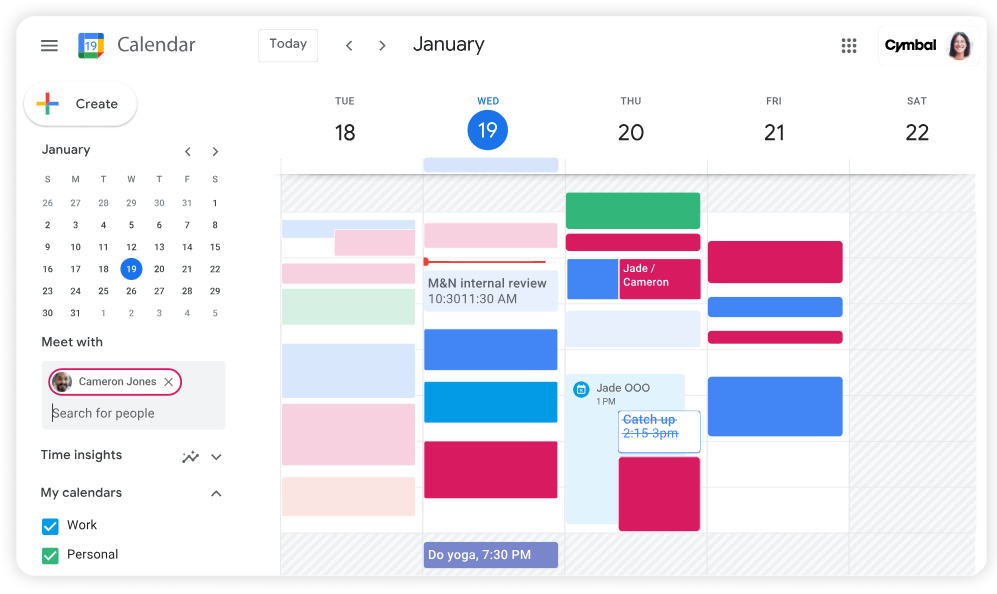
Smart scheduling uses AI to manage your calendar, reduce scheduling conflicts, and help you focus on your most important work. It uses a smart scheduler that updates your schedule in real time and sends automated reminders without extra manual input.
Modern smart schedulers learn how you work. They study your energy patterns, suggest the best time slots for deep work, and prevent double booking before it happens. They also adapt as plans shift, so your calendar stays accurate throughout the week.
Smart scheduling works by analyzing your availability, tasks, preferences, and meetings. It can book appointments, reduce no-shows, and support team calendars across time zones.
Today’s tools include:
- Dynamic adjustments based on real time data
- Smart time blocking
- AI assistant features for follow-ups and upcoming appointments
💡 Pro Tip: Pair your scheduler with Tactiq, so you have meeting summaries, follow-ups, and notes ready the moment your call ends.
Traditional Scheduling vs. Smart Scheduling

Traditional scheduling depends on manual scheduling. You add dates by hand, check calendars on your own, and hope you avoid double bookings. This process leads to missed updates, extra messages, and long delays when plans change.
Smart scheduling automates the scheduling process. A smart scheduler detects conflicts, adjusts time slots, and updates your calendar using real-time data. It can send automated reminders, help book appointments, and support teams working across time zones.
New AI features make the difference even clearer. Smart schedulers can adjust based on your energy levels, plan deep-work blocks, and suggest the right time for critical tasks. Some tools also offer in-meeting features, like asking an AI assistant questions during calls to capture important details and reduce manual note fatigue.
Here's how they compare:
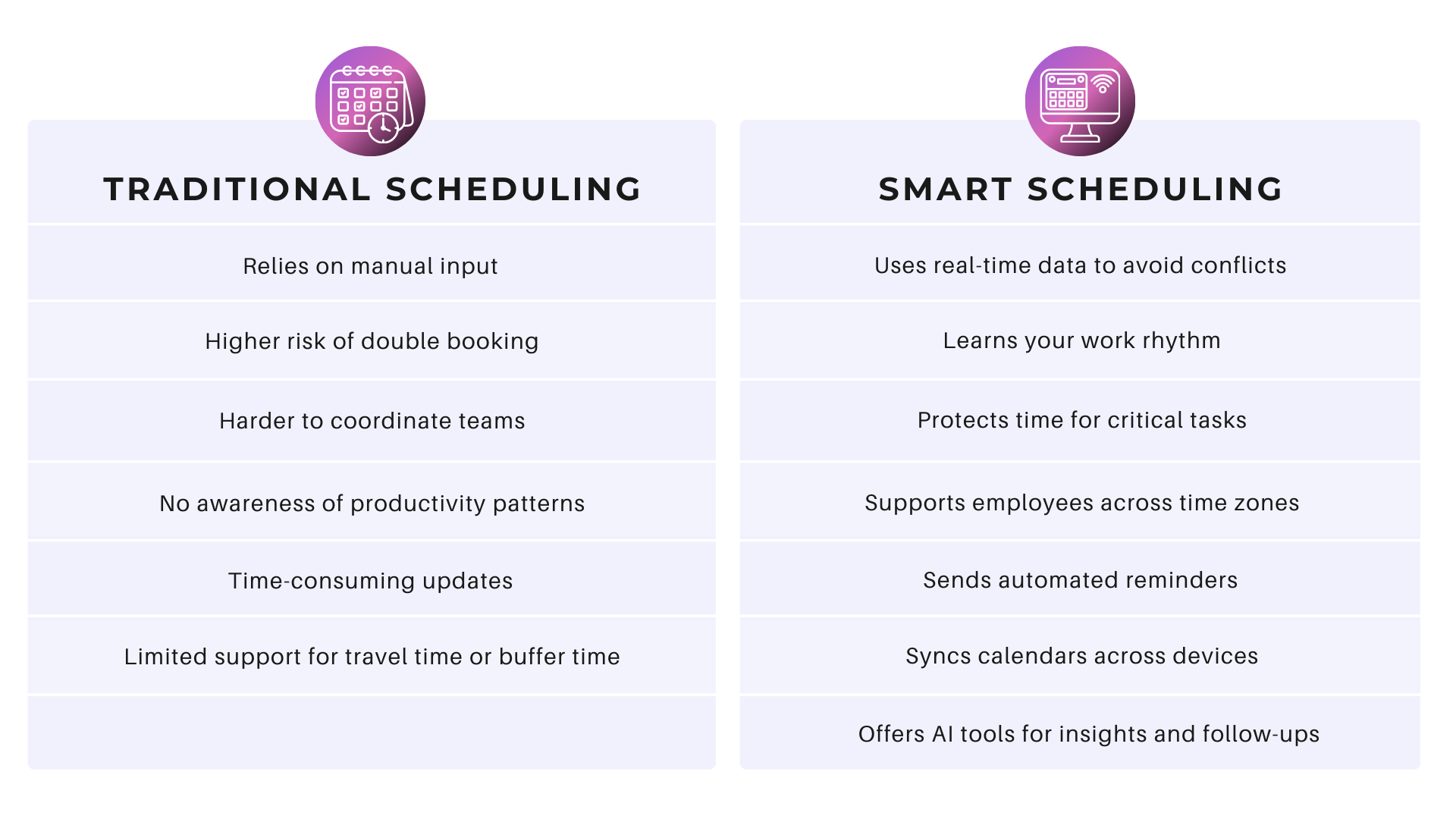
Smart scheduling turns calendars into a system that adapts to your day instead of slowing it down.
10 Benefits of Smart Scheduling
Smart scheduling supports individuals, teams, and small businesses by keeping schedules accurate and easier to manage.
- Avoids scheduling conflicts: A smart scheduler checks calendars in real time and blocks overlapping time slots to prevent double bookings.
- Reduces manual work: It eliminates unnecessary steps in the scheduling process, so you no longer compare calendars or chase updates manually.
- Sends automated reminders: Automatic reminders help reduce no-shows and keep clients, staff members, and teams informed.
- Protects time for critical tasks: Smart tools reserve focus blocks so important work is not interrupted by last-minute meetings.
- Supports dynamic rescheduling: Smart schedulers adjust your schedule when plans shift, keeping your week steady with fewer interruptions.
- Improves team coordination: Teams across different locations can see shared calendars and availability without long message chains.
- Works across multiple platforms: Many tools support web, mobile, and chat apps, giving you access to your schedule from any device.
- Automates follow-up tasks: AI-powered task automation generates summaries, reminders, and follow-up tasks so nothing gets forgotten.
- Learns your productivity patterns: Smart schedulers recognize energy levels and suggest the best time for complex tasks or lighter work.
- Connects with project management tools: Schedulers sync with projects, deadlines, and client work, helping teams stay aligned and organized.
What is the Best Work Scheduling App?
The best work scheduling app is the one that fits your schedule, tasks, and team. A smart scheduler should reduce manual input, avoid scheduling conflicts, and keep your calendar accurate with real-time data.
Smart scheduling software helps many kinds of users, including:
- Remote teams working across time zones
- Freelancers balancing deep work and client calls
- Service providers who book appointments often
- Knowledge workers who need help tracking follow-up tasks
When choosing a scheduler, look for:
- Automation: Sends automated reminders, prevents double booking, and updates your schedule without extra steps.
- Ease of use: Simple controls for time slots, preferences, and calendar settings.
- Integrations: Works with project management and communication tools.
- Customization: Lets you adjust meeting length, buffer time, and availability.
- Team support: Helps employees and clients find the right time to meet.
- Security: Protects your account and data.
A strong scheduling app helps you manage upcoming appointments, support your team, and stay focused on important work.
10 Tools for Smart Scheduling
Here’s a look at ten smart scheduling tools, including their pros, cons, pricing, and what makes them stand out.
1. Google Calendar
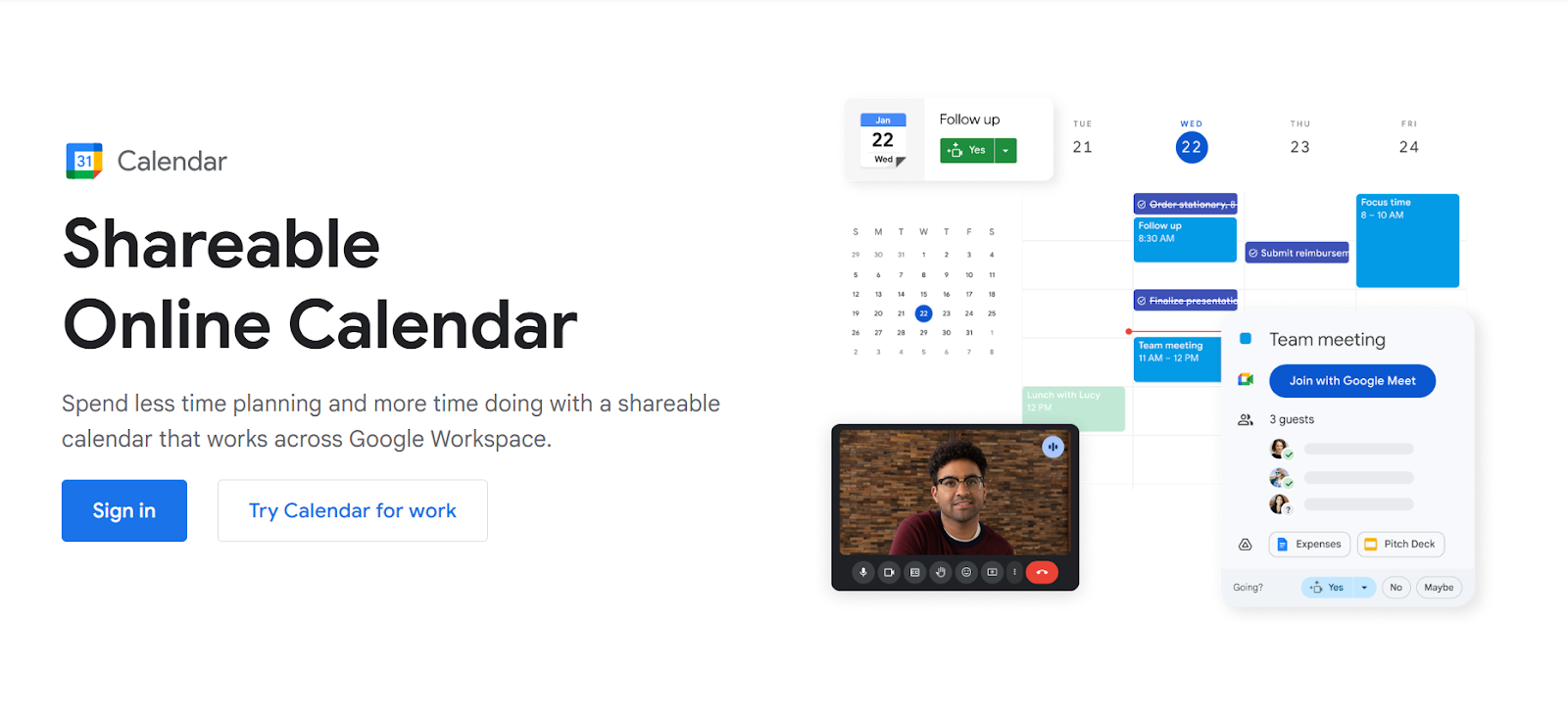
Google Calendar is a smart scheduling tool that gathers your events, tasks, and calendars in one place. It automatically adds events from Gmail, tracks your time with Time Insights, and offers appointment booking pages for easy client scheduling.
Teams can easily share calendars, set working hours, and reserve rooms. It helps prevent double bookings and keeps schedules accurate across devices.
Pros:
- Simple setup
- Automatic event syncing
- Shared calendars for teams
Cons:
- Appointment booking pages require at least a Business Standard plan
Price: Free; Workspace adds premium options
2. Calendly
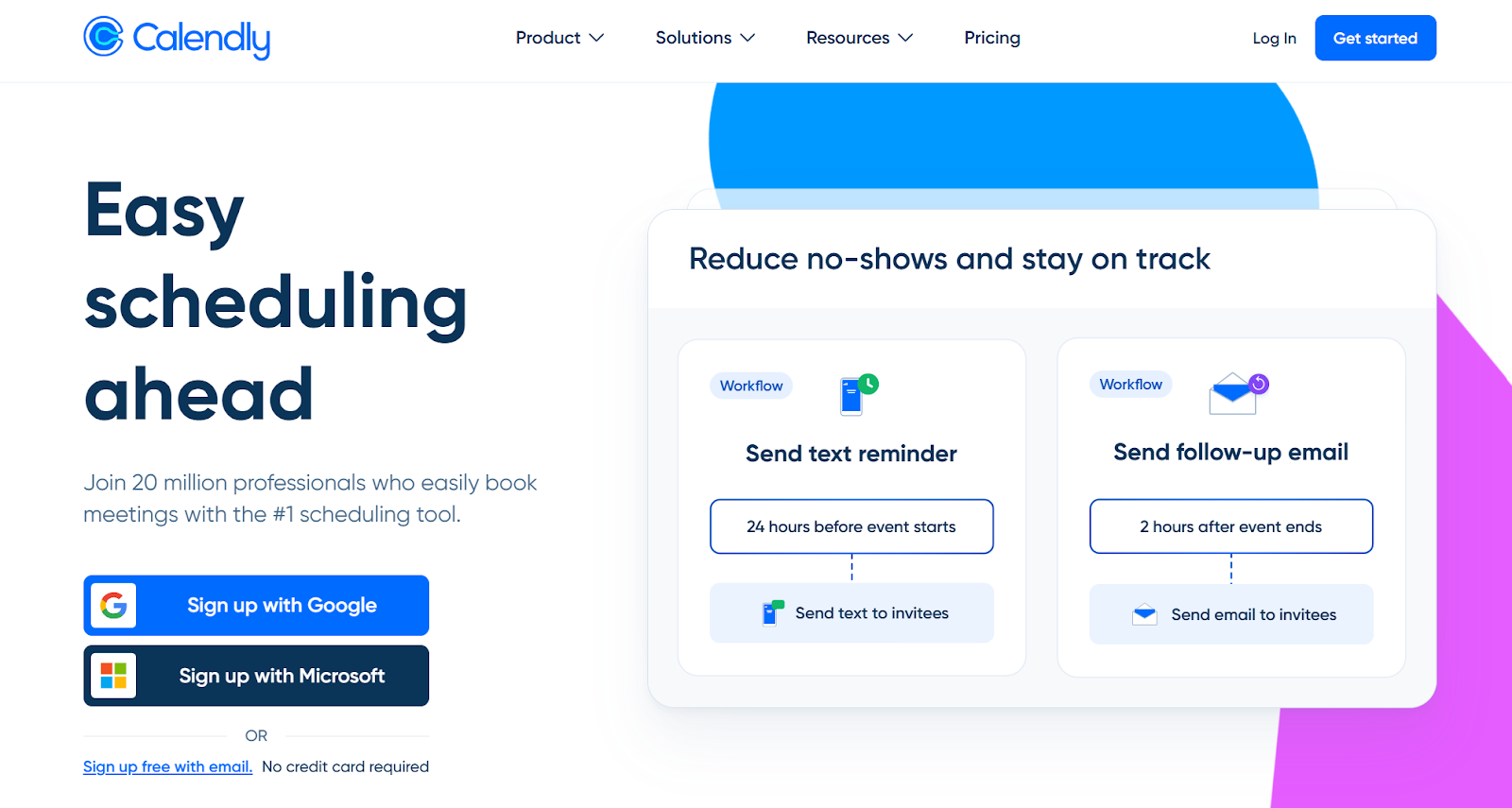
Calendly is a scheduling tool that lets people book appointments through simple event links. You can choose your availability and share a link so clients or coworkers can select a time that fits their schedule. It works well for booking calls, managing different event types, and keeping your calendar organized.
Pros:
- Detailed availability controls like buffers and meeting limits
- Round-robin and collective event types for teams
- Automated workflows and routing forms for smoother scheduling
Cons:
- Payments and CRM integrations (like Stripe, PayPal, and Salesforce) require paid plans
Price: Free plan available; paid plans start at $10 per seat per month.
3. Microsoft Bookings

Microsoft Bookings is an online scheduling tool for businesses that need a simple way to manage appointments and create booking pages. It allows organizations to organize services, assign staff members, and provide customers with a clear view of available time slots. It works well for teams that want a central place to manage schedules and reduce back-and-forth communication.
Pros:
- Syncs appointments with Outlook and Teams
- Supports staff assignment and service-based scheduling
- Shared calendars for teams and departments
Cons:
- Requires a Microsoft 365 subscription
- Less intuitive for non-business users
Price: Plans start at $6 per user per month.
4. Acuity Scheduling

Acuity Scheduling is built for service-based businesses that want a polished, branded booking experience. You can customize your availability, manage multiple locations, host virtual appointments, and sell memberships, packages, or gift cards. It also helps reduce no-shows by requiring deposits and secure payment options. Acuity works well for businesses that run classes, workshops, or recurring sessions and need flexible scheduling tools.
Pros:
- Client self-scheduling with intake forms
- Supports payments, deposits, and recurring subscriptions
- Offers classes, group events, and bundled packages
Cons:
- Complex to set up
- Text message reminders and multi-calendar management require higher-tier plans
Price: Paid plans start at $16 per month.
5. Zoho Bookings
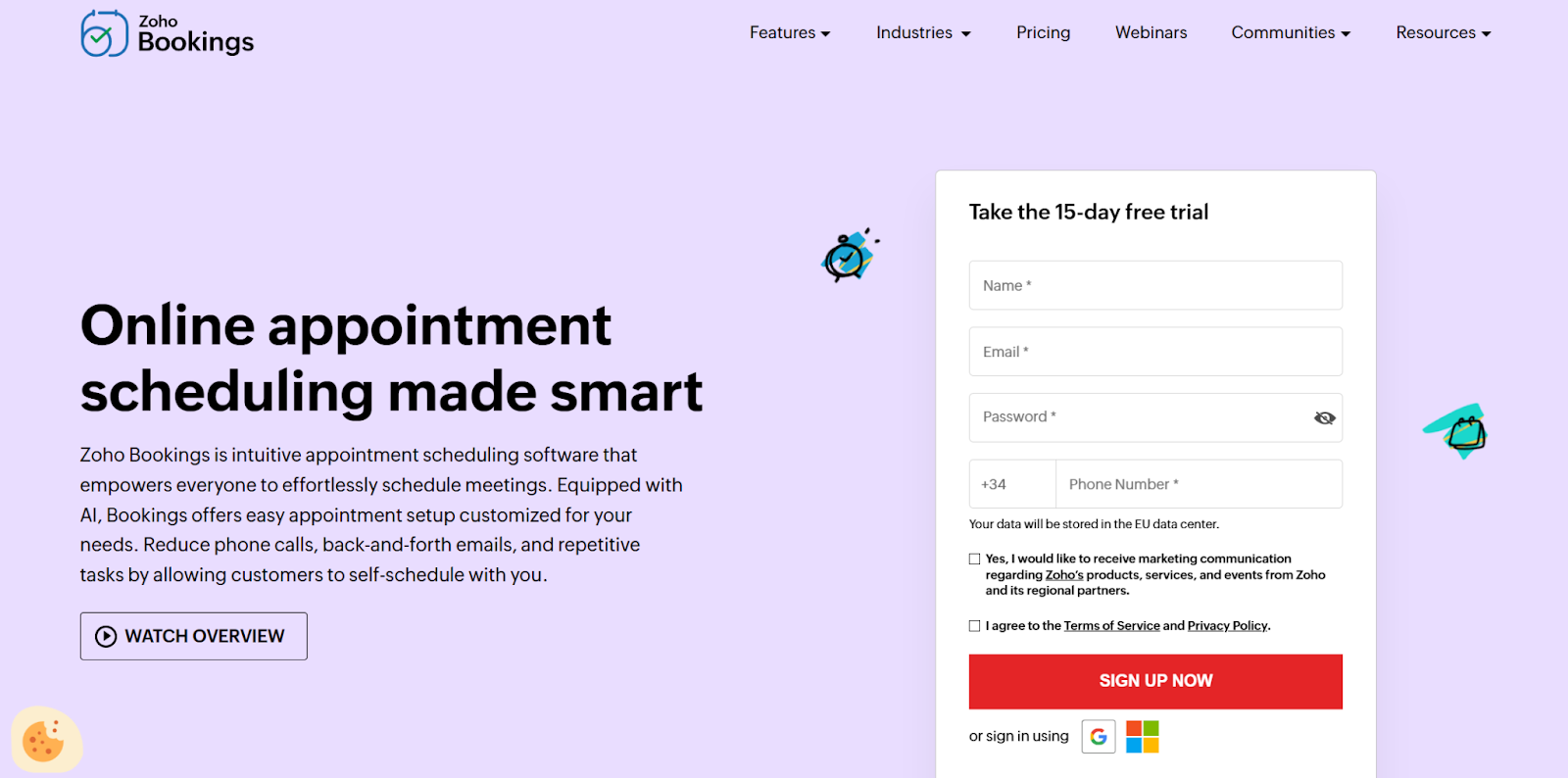
Zoho Bookings is an online scheduling tool that helps teams manage appointments, availability, and booking pages from one dashboard. It supports custom scheduling rules, team calendars, and online meetings.
Zoho’s AI also adapts labels and settings based on your business. It works well for service teams, recruiters, educators, and sales teams that want an easy way for customers to book appointments at any time.
Pros:
- Custom booking pages with branded availability
- Team scheduling and calendar sync
- AI-assisted setup for faster onboarding
Cons:
- Online payments and advanced integrations require the Premium plan
Price: Plans start at €6 per user per month.
6. Appointlet
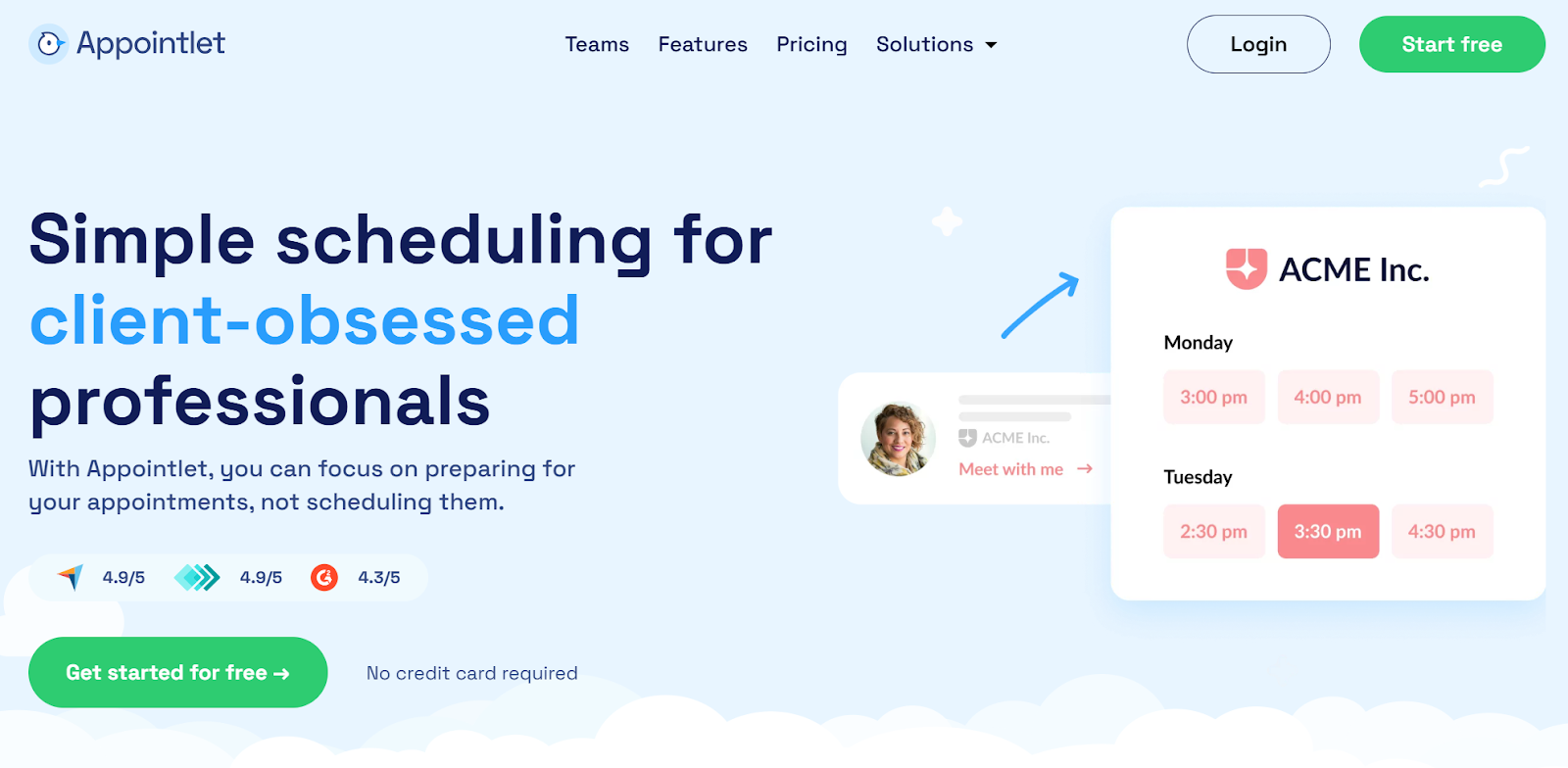
Appointlet is a scheduling tool for professionals who want a polished booking experience for their clients. It helps you manage availability, share booking links, and embed scheduling options on your website.
The platform works well for teams, letting you distribute meetings across staff members or allow clients to choose who they want to meet. It’s a strong fit for sales, HR, education, and service-based teams that need simple, organized appointment management.
Pros:
- Customizable booking pages with branding
- Team scheduling with load balancing options
- Automated invites, reminders, and web conferencing setup
Cons:
- Free plan lacks scheduling pages, meeting types, groups, and automated reminders
Price: Free plan available; Premium starts at $9 per member per month.
7. Doodle
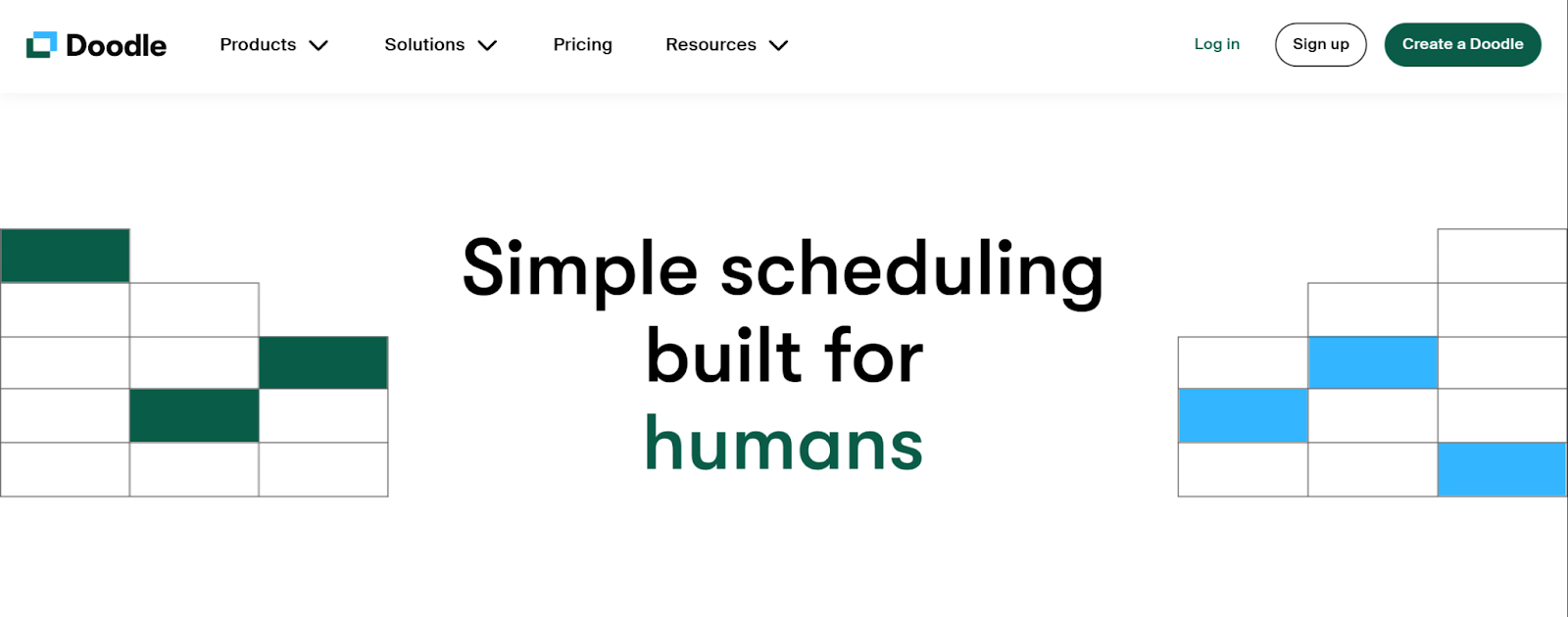
Doodle is built for group scheduling and makes it easy to find a time that works for everyone without long message threads. You can create polls, share booking pages, and let people vote on the best time slot. It also supports paid appointments, branded pages, and simple scheduling for workshops, interviews, and team meetings.
Pros:
- Group polls for finding shared availability
- Branded booking pages for a professional experience
- Supports payments through Stripe
Cons:
- Unlimited booking pages and advanced branding require Pro or Team plans
Price: Free plan available; Pro starts at $6.95 per user per month.
8. HubSpot Meetings
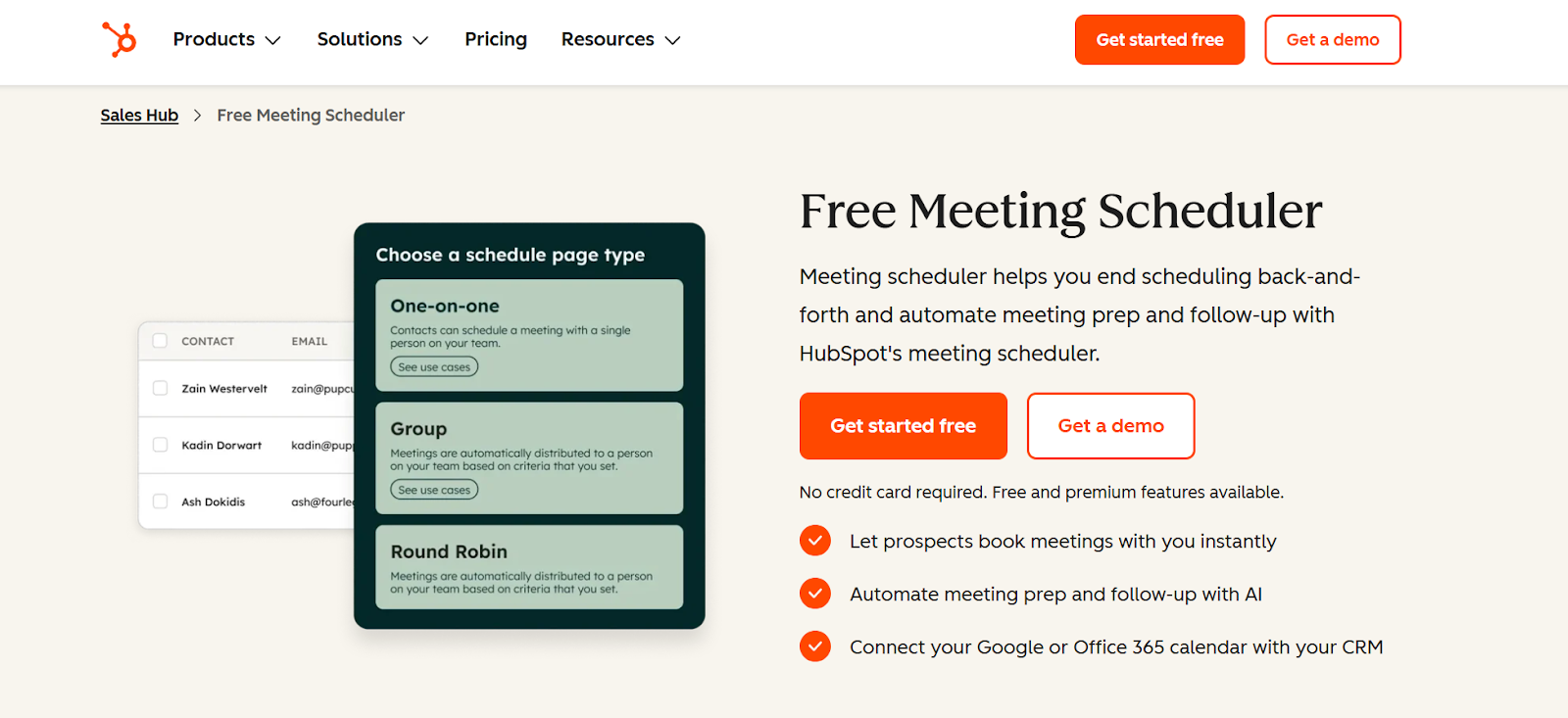
HubSpot Meetings is a scheduling tool built for sales teams that want bookings to be connected directly to their CRM. Prospects can choose a time through a booking link, and HubSpot automatically logs the meeting.
HubSpot AI also handles pre-meeting prep, pulls customer context, and generates follow-up notes after the call.
Pros:
- Real-time calendar sync with HubSpot CRM
- Round-robin and group scheduling for sales teams
- AI-generated prep notes and follow-up actions
Cons:
- CRM-connected features work best with paid Sales Hub plans
Price: Free plan available; premium features start at $9 per month.
9. Setmore

Setmore is a free scheduling tool that gives businesses a branded booking page, online payments, and 24/7 booking through web, mobile, or QR code links. Customers can self-book appointments, join virtual sessions through Zoom or Google Meet, and receive automatic reminders.
Pros:
- Branded booking pages with QR code access
- Online payments with Stripe, Square, or PayPal
- SMS and email reminders to reduce no-shows
Cons:
- Free plan limits total monthly appointments to 200
Price: Free plan available; Pro starts at $5 per user per month.
10. ChatGPT Tasks
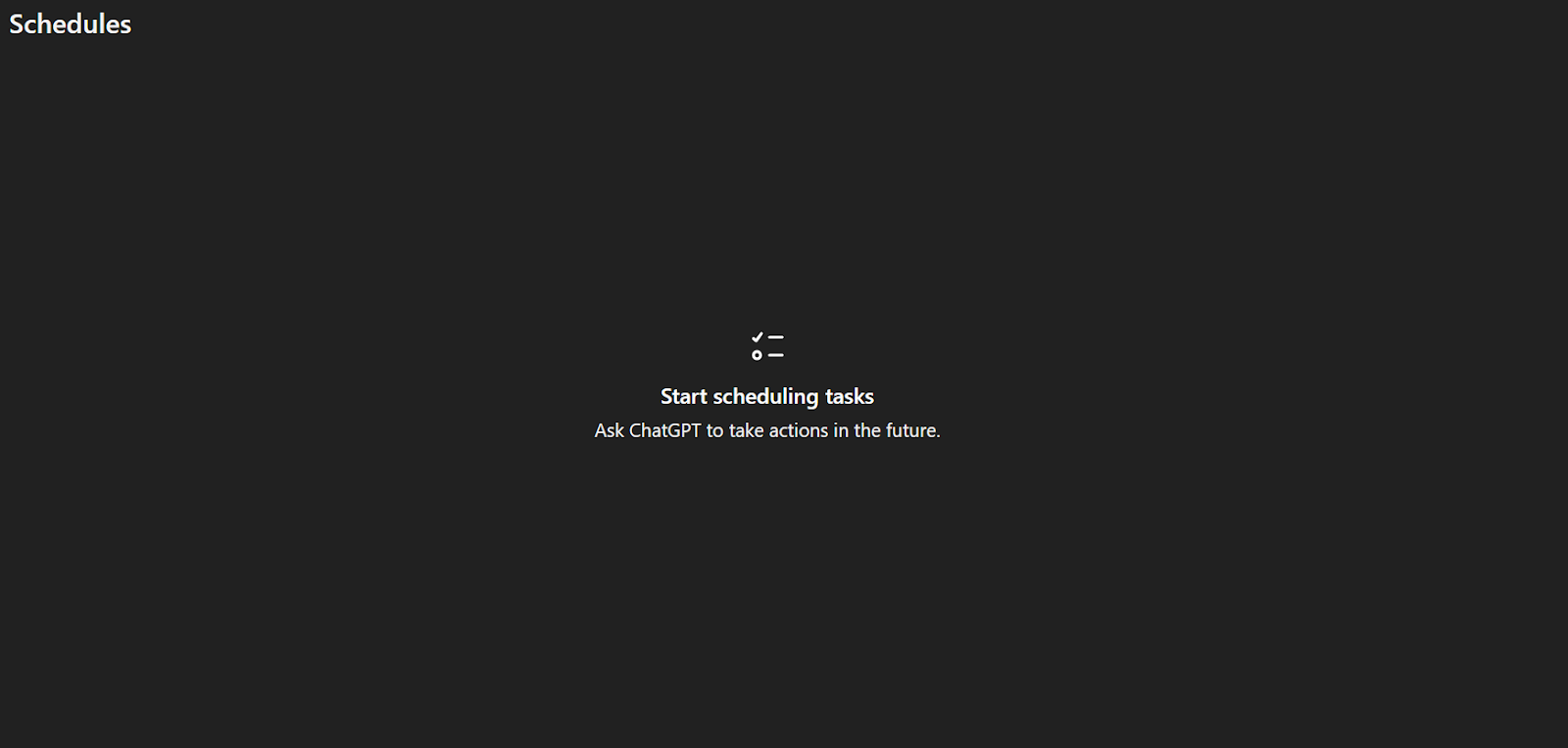
ChatGPT Tasks is a simple smart scheduling feature that lets you set automated reminders, recurring check-ins, and daily briefings. You can ask ChatGPT to create tasks like meeting reminders, habit check-ins, or weekly summaries.
Pros:
- Creates recurring reminders and automated briefings
- Tasks run even when offline and send push or email notifications when complete
- Works across Web, iOS, Android, and macOS
Cons:
- Limited to 10 active tasks
- Windows support is still in development
Price: Included in ChatGPT; no extra cost.
How to Use Tactiq with Your Scheduled Meetings
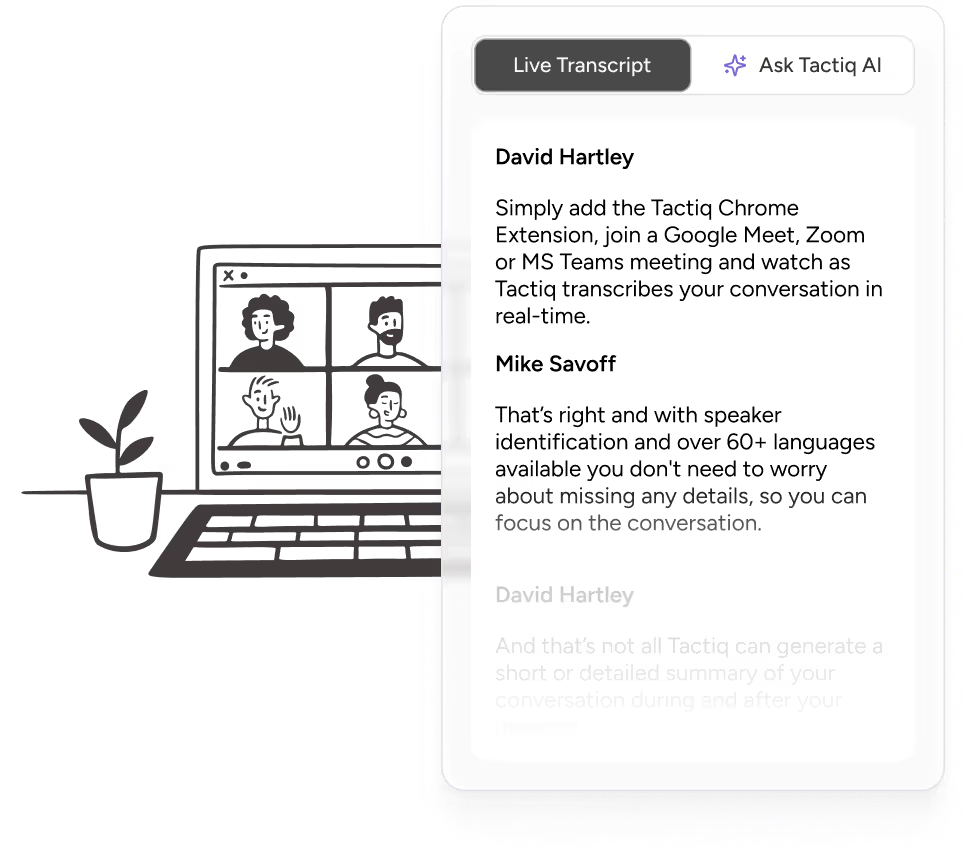
Smart scheduling helps you plan your meetings. Tactiq helps you capture everything that happens during them. It transcribes your calls, highlights key moments, and organizes your details into clear insights you can use right away.
Tactiq works across Zoom, Google Meet, and Microsoft Teams, and you can also upload audio or video files when needed. Once the meeting starts, Tactiq opens a live transcript so you can stay focused instead of taking manual meeting notes.
Here’s how Tactiq supports your scheduled meetings:
- Real-time transcription: Tactiq records every detail in real time and identifies speakers so you always know who said what.
- In-meeting AI: You can ask questions during the call and get instant answers about decisions, tasks, or unclear points.
- Custom AI prompts: Build prompts for project updates, sales notes, client summaries, or follow-ups, then reuse them in one click.
- AI Workflows: Automate post-meeting actions like sending summaries to Google Drive, updating your project tools, or creating follow-ups.
- Export and sharing: Download transcripts, copy summaries, or send insights to your team with one click.
Tactiq turns your scheduled meetings into organized, actionable insights that help your team stay aligned and informed.
Install the free Tactiq Chrome Extension today and stop losing track of what was said in meetings.
{{rt_cta_ai-convenience}}
Why AI-Powered Scheduling Helps You Work Smarter
Smart scheduling is becoming the new standard. AI tools can read your calendar, learn your work patterns, and protect time for important tasks without extra effort. The shift is clear. Scheduling is moving from manual planning to systems that adjust in real time and help you stay focused on the work that matters.
Adding tools like Tactiq strengthens this workflow even more. You can plan your meetings, show up prepared, and let Tactiq handle the details during and after the call. With automated transcripts, summaries, and follow-up actions, your schedule becomes easier to manage from start to finish.
FAQs About Smart Scheduling
Can ChatGPT replace a traditional scheduler?
ChatGPT can handle reminders, recurring tasks, and quick scheduling prompts, but it won’t manage full calendars or complex team logistics. It works best as a simple assistant alongside your main scheduling tool.
Can smart scheduling work for teams?
Yes. Smart scheduling tools support shared calendars, time-zone coordination, availability checks, and automated reminders, making it easier for teams to find the right time and avoid conflicts.
Is there an AI for scheduling?
Yes. Tools like Calendly, Google Calendar, Zoho Bookings, and ChatGPT Tasks use AI to manage availability, prevent double bookings, and automate routine scheduling tasks.
What is smart scheduling?
Smart scheduling uses AI to organize your calendar, adjust to changes, and help you prioritize important tasks. It reduces manual steps and keeps your schedule accurate.
Is smart scheduling easy to use?
Most tools are designed to be simple. You set your availability, share your link, and let the AI handle the rest. Many platforms also sync with your calendar, so updates happen automatically.
A smart schedule is a digitally managed calendar that uses AI or automation technology to optimize your time. It helps prioritize tasks, resolve scheduling conflicts, and send automatic reminders to ensure efficient time management.
Intelligent scheduling refers to using AI-powered tools to automate the scheduling process. These tools help eliminate double bookings, suggest meeting times, and integrate with other software to simplify time management.
To use a smart schedule, start by syncing it with your calendar and integrating it with tools like project management software. Use automated reminders, conflict detection, and prioritization features to organize your upcoming appointments and critical tasks.
Smart schedules save time, reduce errors, and minimize administrative workload. By preventing scheduling conflicts and automating routine tasks, they free up time to focus on meaningful work while ensuring you meet all appointments and deadlines.
Tactiq boosts your smart scheduling by providing real-time meeting transcriptions and instant AI-generated summaries. You stay organized, capture every detail, and turn meetings into actionable insights without manual note-taking.
Want the convenience of AI summaries?
Try Tactiq for your upcoming meeting.
Want the convenience of AI summaries?
Try Tactiq for your upcoming meeting.
Want the convenience of AI summaries?
Try Tactiq for your upcoming meeting.









